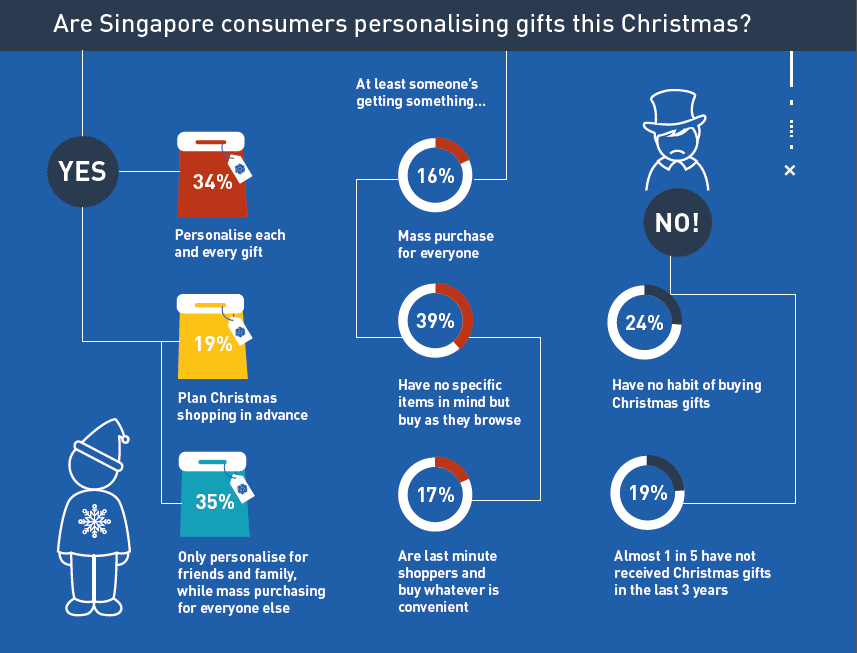Why Christmas e-shopping sucks for Singaporean customers
By Zafar Anjum December 28, 2016
- Shoppers want cross-channel options more than new-age services
- Prefer retailers with physical store coupled with e-commerce & mobile app

This is the festive season and no one wants to hear bad news! But businesses need to hear news both good and bad to improve their bottom-line.
This year, the message from Singaporeans to Santa is, “Yes, You Can Do Way Better!”
With high internet and mobile penetration rates, it is little surprising that Christmas online shopping is picking up among Singaporeans. However, only 29% of consumers in Singapore were delighted with the Christmas gifts they received over the last three years, says the SAP Hybris Singapore Christmas Shopper survey of more than 1,000 e-commerce shoppers.
delighted with the Christmas gifts they received over the last three years, says the SAP Hybris Singapore Christmas Shopper survey of more than 1,000 e-commerce shoppers.
SAP Hybris, part of the enterprise software company SAP, shared the results of the survey in December, which revealed that more than half of Singapore consumers (51%) were dissatisfied with the Christmas gifts they received over the last three years.
This is likely due to the lack of planning amongst the majority of Singaporeans, who do not typically create their shopping lists ahead of time; 39% of survey respondents purchase as they browse in-store for gifts. In fact, the survey found that almost one in five respondents purchase items for everyone on their list (16%) or shop at the last minute and simply buy whatever is convenient (17%).
Among those surveyed, almost one fifth (19%) did not even receive Christmas gifts over the last three years, and another 24% are not actually in the habit of buying Christmas gifts for their loved ones. Amongst those who do shop for Christmas gifts, 69% will try to personalise gifts for at least their close friends and family.
Need for contextual marketing
The e-commerce market in Singapore is expected to be worth US$5.4 billion (S$7.46 billion) by 2025, according to a report by Temasek and Google released earlier in May this year, and is expected to make up 6.7% of all retail sales by 2025.
“With more than two thirds of Singapore consumers looking to personalise gifts for their loved ones this Christmas, it is critical for retailers and marketers to be thinking of contextual marketing to understand what they are looking for and ease the gift-hunting experience,” said Nicholas Kontopoulos (pic), Global Vice President of Fast Growth Markets for SAP Hybris in the Asia Pacific region.
“Retailers have the opportunity to thrive across many touch points with well-executed hybrid experiences that drive engagement and sales to get Singaporeans spending beyond Christmas,” he added.
When asked to rank the importance of retail offerings, the research also found that Singapore shoppers want cross-channel options more than new-age services like digital wallets and augmented reality store experiences. Still, 28% customers would like to have Augmented Reality in their e-commerce experience.
When it comes to Christmas shopping, Singaporeans prefer retailers with a physical store coupled with both e-commerce and mobile app (68%), as well as those who offer self-pickup services at physical store (54%). In addition, 65% of respondents stated that retailers can improve their Christmas shopping experience by offering free shipping, 48% believed on-time delivery would be a benefit, and 41% noted that gift customization would signal yet another improvement.
Brick and mortar stores are definitely not dead
Even though Singaporeans are amongst the most tech-savvy spenders in Asia, and no strangers to e-commerce, the brick and mortar stores are definitely not dead, said Kontopoulos.
“In fact, the SAP Hybris survey found that 39% of Singaporeans still enjoy browsing through stores. This reinforces what we have been telling retailers for some time: Singapore is a truly multi-channel market, where most consumers are using a combination of devices in their online and offline shopping. The findings also point us to a future where offline and online shopping are no longer two separate business models. Singaporeans are demanding a seamless omnichannel shopping experience,” added Kontopoulos.
In a media briefing, Kontopoulos summarized the implications of the survey for e-commerce companies and advised them to incorporate the following:
- Have contextual marketing
- Have an omnichannel strategy
- Have front and backend integration


